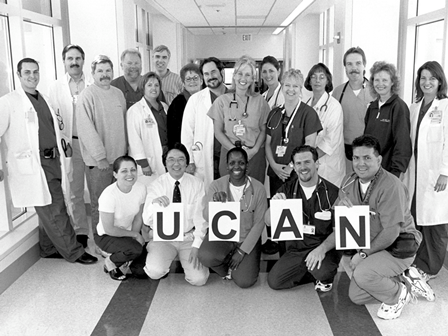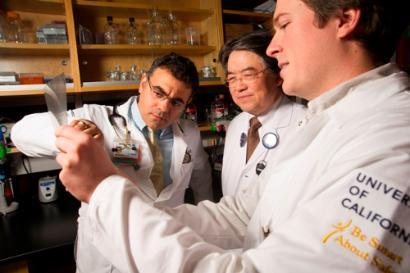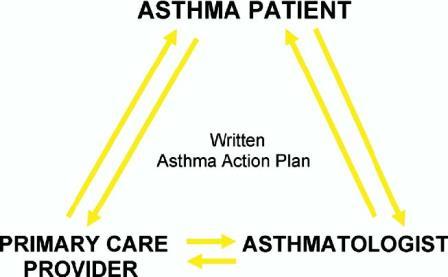Pulmonary, Critical Care and Sleep Medicine
UC Davis Asthma Network (UCAN)
The UC Davis Asthma Network or UCAN™ was founded in 1996 and has become a nationally recognized clinic for its excellence in integrated patient care and patient safety outcomes.

In UCAN Clinic our team of dedicated asthma experts exemplifies the mission of the university: patient care, education, and research. We address the healthcare disparities and unmet needs in asthma patient education and patient safety for Northern California.
Asthma is not a single disease. We seek to help patients and their providers recognize uncontrolled asthma and delineate each patient’s asthma phenotype. The phenotype or sub-category of asthma is determined by each individual patient’s genetics and how it interacts with the environment. Simple laboratory testing, spirometry, and exhaled nitric oxide measurements in our UCAN Clinic can provide vital clues to direct patient-centered management.
UCAN offers immediate help and education with two certified Asthma Case Managers/Educators who are Registered Respiratory Therapists (RRT). Our RRTs work with a dedicated pulmonologist, each an expert in severe asthma. We aim to teach and enable each patient to co-manage their asthma, and we have the experience and expertise to do it successfully.
UC Davis was the first in California (and west of the Mississippi) university-based Bronchial Thermoplasty (BT) center recommended for those patients with severe asthma not responsive to medication. Now, we are joined by other centers that also offer BT to severe asthmatics around the country.
In 2011, UC Davis faculty were the first to coin the term “Asthma-COPD Overlap Syndrome (ACOS)”, later recognized internationally by the Global Initiative for Asthma (GINA) in 2014 and the Global Initiative for Chronic Obstructive Lung Disease (GOLD) in 2015. In 2017, it was renamed Asthma-COPD Overlap (ACO) based on a broader expert consensus.

UC Davis Health is currently a principal site for the ongoing National Institute of Health (NIH)/NHLBI PreCISE Consortium (Precision Interventions for Severe Asthma) that seeks to discover new therapies for patients who experience frequent and severe asthma attacks.
Often the reasons for poorly controlled asthma are the incorrect use of standard-of-care inhalers that we call “controllers.” One size does not fit all. Medications may block or interfere one mechanism of asthma, but up-regulate another pathway that causes asthma symptoms to persist, lead to desensitization, or become less effective as the disease evolves and co-morbidities complicate management. This makes the treatment and management of asthma complex. Uncontrolled asthma can become dangerous, and often life threatening.
Hospitalizations are very frightening for asthma patients and their families. UCAN can dramatically reduce the need for emergency room visits and hospitalization for asthma attacks.
The first step for all patients and their physician and/or provider is to recognize what uncontrolled asthma looks like (phenotype) and to confirm the diagnosis of asthma. In general, asthma is over-diagnosed, but Severe Asthma is under-diagnosed. UCAN can help.
Our patients learn about Severe Asthma, how to participate in their own healthcare, and recognize acute attacks or exacerbations early. They engage our nursing and RRT staff often and early in order to maintain their care outside the clinic via individualized Asthma Action Plans and frequent communication with our dedicated faculty.
Our mantra: “Control asthma before it controls you. Attack your asthma before it attacks you.”
We provide our patients:
- A personalized written Asthma Action Plan
- Direct access to the Asthma Case Managers via telephone (office), pager, and EMR messaging.
- A comprehensive plan to prevent repeated asthma attacks and continued prednisone use.
- Evaluation and treatment using asthma biologic therapies (g. anti-IgE, anti-IL5, anti-IL5R, anti-IL13/4R).
- Evaluation and treatment using Bronchial Thermoplasty.
- Our empathy and dedication to performing a “clinical trial of one” because every person living with Severe Asthma is unique.
- The option of participating in ongoing clinical trials.
Central to our approach to each asthmatic is patient safety. We interpret current international guidelines, clinical evidence, and each patient’s phenotype and endotype to create a personalized treatment strategy and drug regimen. Every patient must recognize the danger of taking too much prednisone. We recognize from our vast patient experience the importance of making home a safer place to live and play.

By taking action, we create the Triangle of Care™ to control patients’ asthma symptoms. While we pursue for a cure for asthma, our central goal at UC Davis and UCAN is to transform patients' lives, one patient at a time.
Our Team
Sam Louie, M.D.
Co-Director, Pulmonologist, Asthma Sub-Specialist
Nicholas Kenyon, M.D.
Co-Director, Pulmonologist, Asthma Sub-Specialist
Amir Zeki, M.D.
Co-Director, Pulmonologist, Asthma Sub-Specialist
Celeste Kivler, RRT/AE-C
UCAN Program Coordinator, Respiratory Therapist
William Stoll, RRT
Respiratory Therapist
